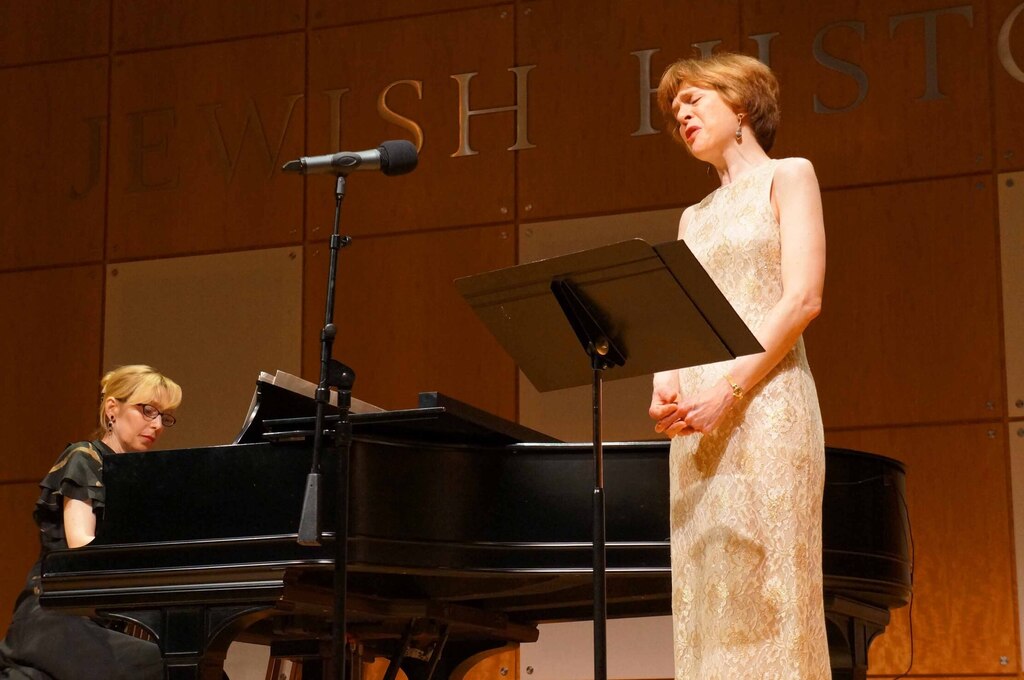Hugo Weisgall's song cycle The Golden Peacock performed at two major New York concerts
Monday, June 11, 2012

Soprano Ena Freeman & Laura Leon Photo: Gina Genova
It was an honor to perform Hugo Weisgall's extraordinary Yiddish song cycle, The Golden Peacock: Seven Popular Songs from the Yiddish for Voice and Piano, with noted soprano Emily Duncan-Brown at the January 10, 2010 Center for Jewish History international symposium, co-sponsored by the American Society for Jewish Music.
On June 3, 2012 soprano Ena Freeman and I performed The Golden Peacock at the 2012 ASJM annual contemporary concert Music for Our Time also at The Center for Jewish History. Works by Leonard Bernstein, Jody Rockmayer, Ben Yarmolinsky, Mark Zuckerman were performed by Young Artists from Mannes College of Music. Ena and my connection to these songs goes back to the May 1997 ASJM contemporary concert at Hebrew Union College.
Hugo Weisgall is considered the preeminent American composer of opera in the 20th century. His last opera, "Esther," received its acclaimed premiere at the New York City Opera in 1993, and recently had its triumphant return to the NYCO in November 2009, thanks to the vision of its General Manager and Artistic Director George Steel.
Weisgall also composed a significant group of songs and song cycles. Quoting American composer Bruce Saylor's entry on Weisgall in Grove Dictionary of Music: "His works deal with crucial philsophical, social and moral dilemmas of the 20th century." During interviews with the composer, Weisgall stated that The Golden Peacock, using pre-existing Yiddish folksongs, was his personal response to the Holocaust."
A witness to the liberation of the Terezin concentration camp, and unable to save his relatives from perishing in the Holocaust, while serving as an assistant military attache in Europe during WWII, Hugo Weisgall undertook his personal sense of responsibility as a Jew and as a Jewish composer to write a work about what took place, beginning in 1960 and completing the work in 1976.
During a taped telephone conversation with Hugo Weisgall on July 7, 1981 for my Teachers College dissertation on his songs and song cycles, he shared why he felt compelled to compose this work:
"There is no question of the fact that the reason I am being drawn more and more to Jewish material is because I feel that I have not made the proper statement about the whole business of Hitler and the Holocaust. The main reason for The Golden Peacock is a kind of defiance--that it has to do with what I feel about my having to make a statement about the Holocaust. Who else is going to do Yiddish folk songs if composers like myself don't do them."
My connection to the composer and my history with The Golden Peacock goes back to the 1970s when Weisgall himself, a copy of the manuscript in hand, approached me in the hallway in Rathaus Hall, then home of Queens College's music department--now, and which has been for many years, the Aaron Copland School of Music. He handed me the score, stating I should "go learn this from your teacher," which I did. Morey Ritt, with whom I studied, gave the world premiere of The Golden Peacock with the late great soprano Judith Raskin at Carnegie Hall's Weill Recital Hall, which they followed with the work's recording on the CRI label. It was an honor to learn it with Morey, and it has been a privilege to be performing this remarkable work ever since.
Excerpt from 2012 Music In Our Time Program Notes:
“In Hugo Weisgall’s The Golden Peacock, Jewish music is presented with a brilliant synthesis of the folksong and art music styles. One of America’s most important opera composers, Weisgall’s (this) work may be considered a landmark and may very well rank with Bartok’s settings of Hungarian songs and Britten’s English songs.
Weisgall goes directly to the musical or poetic center of the song itself, purifying an emotion, highlighting an attitude, pinpointing a psychological complexity, invigorating an inherent rhythm, and overall, making room for the song to flow and expand into an artistic entity.
In a 1980 interview with pianist Laura Leon, Weisgall said: "There is no question of the fact that the reason I am being drawn more and more to Jewish material is because I feel that I have not made the proper statement about the whole business of Hitler and the Holocaust. The man reason for The Golden Peacock is a kind of defiance-that it has to do with what I feel about my having…to make a statement about the Holocaust…Who else is going to do Yiddish folk songs…if composers like myself don’t do them."
Hugo Weisgall's centenary was marked with a 100th Anniversary Tribute presented by the American Society for Jewish Music on Sunday, November 18, 2012 at The Center for Jewish History, featuring the internationally renowned soprano Lauren Flanigan, who sang the role of Esther in the opera and cellist Eric Bartlett of the New York Philharmonic.